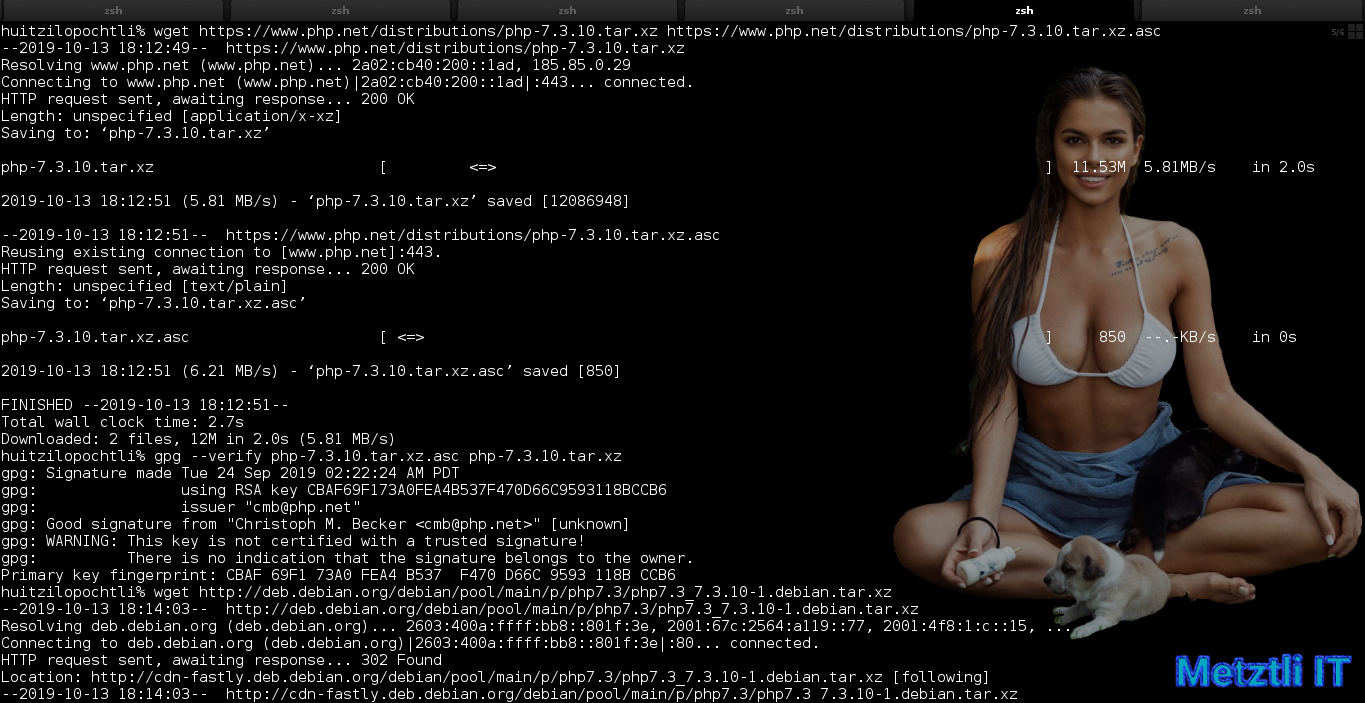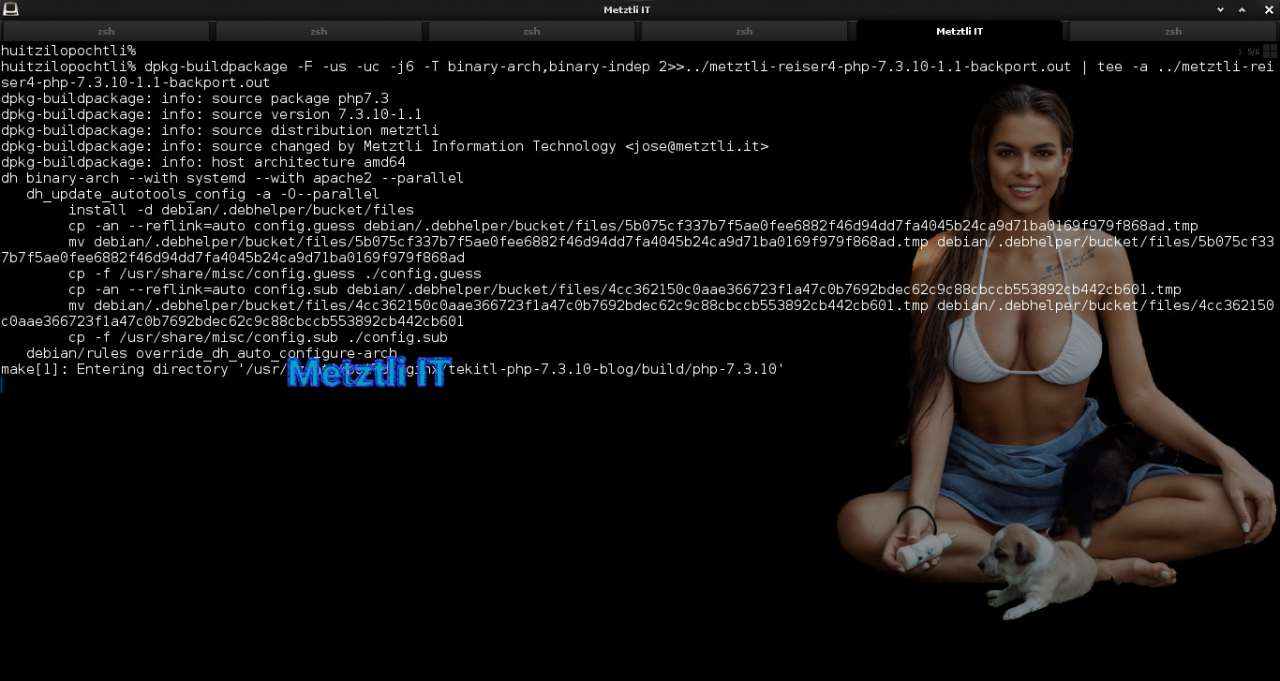Prior to European invasion of Ixachitlan1 there were xoloitzcuintzintin2 –not ‘puppies’…
Although on special occasions and/or ceremonies the xoloitzcuintli was eaten by the olmecah, Toltecah –and later the Mexicah – it was during and after the Spanish monarchy’s sponsored invasion, when Spain’s genetic waste and their analogous symbiotic parasite rats infested Mexico-Tenochtitlan and devoured the xoloitzcuintzintin with such voracity the unique canine specimens were almost driven into extinction. Alarmed at the Spaniards’ rapacious craving for xoloitzcuintzintin meat, a number of xoloitzcuintli specimens either fled to or where surreptitiously taken to Mixtecapan –nowdays Oaxaca– defining a do-or-die inflection point to spare the xoloitzcuintli from total annihilation by the voracious alien Tzitzimimeh –embodied in the Spanish fanatical Christian terrorists. Conniving and co-opting military, logistic, and tactical support from jaundiced subjugated native ‘city-states’, Spanish scum gloated3 over their divide-and-conquer strategy to achieve ensuing destruction and pillage of the Mexicah’s highly sophisticated and cultured eponymous Altepetl (’city state’). Fact is, occupier Iberian State (IS) terrorist cliques even have appropriated ‘Mexican‘ – transliterated into their Spanish dialect by concatenating suffixes ‘-o‘ or ‘-a‘ for male or female, respectively – as their ‘ethnic‘ moniker; thus besmirching the legitimate ancient and surviving Mexicah / Nahua ethnic genotype with current Iberian unabated corruption, lawlessness, plundering, and low intensity environmental, economic, cultural, and ethnic genocide, all of which had been gradually building up since 1521.
Hmmm, pardon my memory focus lapse, I meant to begin with…

Realizing that the PHP developer of pthreads has, using the proverbial expression, ‘thrown his puppy…er, baby, out with the bathwater‘5, I had second thoughts about writing this post. I mean, to build the latest PHP 7.3.9̶ 10 the ‘Debian way‘ for Metztli Reiser4 / Debian Buster BPs was the only topic I was gonna annotate as my reference post. Notwithstanding, online I read of people literally ‘twerking‘ with phpize to build pthreads support for their PHP ZTS build and I thought: the ‘Debian way‘ really simplifies the procedure. What I mean is, after we hack the Debian packaging for PHP into producing a KrakJoe6 pthreads extension, all we have to do is install relevant DEB package and…that’s it! ![]() to enable the much sought after feature. I am not an expert on Toltecayotl –much less pthreads – so we will recycle a couple small test ‘pthreaded‘ programs, execute them, and that –hopefully– will be a measure of our success
to enable the much sought after feature. I am not an expert on Toltecayotl –much less pthreads – so we will recycle a couple small test ‘pthreaded‘ programs, execute them, and that –hopefully– will be a measure of our success ![]()
NOTE: PHP 7.3.11 Fixes CVE-2019-11043, thus upgraded resources in this post. All references to PHP 7.3.10 apply equally to PHP 7.3.11 –including the patches I create here. (10-27-2019)
See https://bugs.php.net/bug.php?id=78599
Build PHP 7.3.10 the ‘Debian way’ on Metztli Reiser4 / Debian 10 Buster
We fetch PHP 7.3.10 and corresponding asc extension file to verify source integrity:
Shell
wget https://www.php.net/distributions/php-7.3.10.tar.xz https://www.php.net/distributions/php-7.3.10.tar.xz.asc | |
gpg --verify php-7.3.10.tar.xz.asc php-7.3.10.tar.xz |
For our Debian Buster backports we will be using Debian Sid packaging for PHP 7.3.10-1; ![]() maintainer has caught up!
maintainer has caught up!
Shell
wget http://deb.debian.org/debian/pool/main/p/php7.3/php7.3_7.3.10-1.debian.tar.xz |

Subsequently, create build directory and untar PHP 7.3.10 and Debian packaging for 7.3.10-1 into the former untarred source:
Shell
mkdir --verbose build && tar -C build -xPf php-7.3.10.tar.xz | |
tar -C build/php-7.3.10 -xPf php7.3_7.3.10-1.debian.tar.xz |

For Debian 10 Buster we will be installing the same package names as in prior relevant blog post for Debian Stretch – thus satisfying our PHP 7.3.10 build requirements. Please review if you want to install the latest MariaDB available from MariaDB.org repositories, instead of Debian’s:
Shell
apt-get update | |
apt-get install install autoconf automake bison chrpath debhelper libmariadb-dev-compat dh-apache2 dpkg-dev flex freetds-dev libapparmor-dev libapr1-dev libargon2-0-dev libbz2-dev libc-client2007e-dev libcurl4-openssl-dev libdb-dev libedit-dev libenchant-dev libevent-dev libexpat1-dev libfreetype6-dev libgcrypt20-dev libgd-dev libglib2.0-dev libgmp3-dev libicu-dev libjpeg-dev libkrb5-dev libldap2-dev liblmdb-dev libmagic-dev libmhash-dev libnss-myhostname libonig-dev libpam0g-dev libpcre2-dev libpng-dev libpq-dev libpspell-dev libqdbm-dev librecode-dev libsasl2-dev libsnmp-dev libsodium-dev libsqlite3-dev libssl-dev libtidy-dev libtool libwebp-dev libwrap0-dev libxml2-dev libxmlrpc-epi-dev libxmltok1-dev libxslt1-dev libzip-dev locales-all netbase netcat-traditional re2c systemtap-sdt-dev tzdata unixodbc-dev zlib1g-dev dh-systemd libsystemd-dev firebird-dev mariadb-server |
The list above is derived from debian/control file in Debian packaging for php7.3_7.3.10-1 on AMD64 and we only get a couple of ‘Notes‘:
Note, selecting ‘apache2-dev’ instead of ‘dh-apache2′
Note, selecting ‘libargon2-dev’ instead of ‘libargon2-0-dev’
We change directory to PHP 7.3.10 source, if we are not already there yet:
Shell
cd build/php-7.3.10/ |
create a link to debian/patches:
Shell
ln -s debian/patches |
and apply the patches with quilt:

Shell
quilt push -a --fuzz=0 |
all patches should apply flawlessly –as seen in the snapshot taken at the end of the quilt procedure:

NOTE: If we are leveraging Debian packaging for php7.3_7.3.10-1.debian.tar.xz to build upstream PHP 7.3.11, we need to upgrade the version; otherwise, the generated packages will have lower incorrect version. Thus we need to correct the debian/changelog with:
Shell
dch -v 7.3.11-1 |
We may begin our PHP 7.3.10 build with the following directive:
Shell
dpkg-buildpackage -F -us -uc -jX -T binary-arch,binary-indep |
From relevant man page, where X:= Number of jobs allowed to be run simultaneously, number of jobs matching the number of online processors if auto is specified (since dpkg 1.17.10), or unlimited number if jobs is not specified, equivalent to the make(1) option of the same name (since dpkg 1.14.7, long option since dpkg 1.18.8).

After thirty(30) to forty-five(45) minutes the Debian packaging for php7.3_7.3.10-1.1 build ends:

July 10, 2020: sorry about the links – I believe they are fixed now.
php7.3-common_7.3.11-1_amd64.deb
php7.3-cli_7.3.11-1_amd64.deb
php7.3-readline_7.3.11-1_amd64.deb
php7.3-json_7.3.11-1_amd64.deb
php7.3-opcache_7.3.11-1_amd64.deb
libapache2-mod-php7.3_7.3.11-1_amd64.deb
libphp7.3-embed_7.3.11-1_amd64.deb
php7.3_7.3.11-1_all.deb
php7.3-bcmath_7.3.11-1_amd64.deb
php7.3-bz2_7.3.11-1_amd64.deb
php7.3-cgi_7.3.11-1_amd64.deb
php7.3-curl_7.3.11-1_amd64.deb
php7.3-dba_7.3.11-1_amd64.deb
php7.3-dev_7.3.11-1_amd64.deb
php7.3-enchant_7.3.11-1_amd64.deb
php7.3-fpm_7.3.11-1_amd64.deb
php7.3-gd_7.3.11-1_amd64.deb
php7.3-gmp_7.3.11-1_amd64.deb
php7.3-imap_7.3.11-1_amd64.deb
php7.3-interbase_7.3.11-1_amd64.deb
php7.3-intl_7.3.11-1_amd64.deb
php7.3-ldap_7.3.11-1_amd64.deb
php7.3-mbstring_7.3.11-1_amd64.deb
php7.3-mysql_7.3.11-1_amd64.deb
php7.3-odbc_7.3.11-1_amd64.deb
php7.3-pgsql_7.3.11-1_amd64.deb
php7.3-phpdbg_7.3.11-1_amd64.deb
php7.3-pspell_7.3.11-1_amd64.deb
php7.3-recode_7.3.11-1_amd64.deb
php7.3-snmp_7.3.11-1_amd64.deb
php7.3-soap_7.3.11-1_amd64.deb
php7.3-sqlite3_7.3.11-1_amd64.deb
php7.3-sybase_7.3.11-1_amd64.deb
php7.3-tidy_7.3.11-1_amd64.deb
php7.3-xml_7.3.11-1_amd64.deb
php7.3-xmlrpc_7.3.11-1_amd64.deb
php7.3-xsl_7.3.11-1_all.deb
php7.3-zip_7.3.11-1_amd64.deb
…and corresponding SHA256SUMs:
php7.3-common_7.3.11-1_amd64.deb.SHA256SUM
php7.3-cli_7.3.11-1_amd64.deb.SHA256SUM
php7.3-readline_7.3.11-1_amd64.deb.SHA256SUM
php7.3-json_7.3.11-1_amd64.deb.SHA256SUM
php7.3-opcache_7.3.11-1_amd64.deb.SHA256SUM
libapache2-mod-php7.3_7.3.11-1_amd64.deb.SHA256SUM
libphp7.3-embed_7.3.11-1_amd64.deb.SHA256SUM
php7.3_7.3.11-1_all.deb.SHA256SUM
php7.3-bcmath_7.3.11-1_amd64.deb.SHA256SUM
php7.3-bz2_7.3.11-1_amd64.deb.SHA256SUM
php7.3-cgi_7.3.11-1_amd64.deb.SHA256SUM
php7.3-curl_7.3.11-1_amd64.deb.SHA256SUM
php7.3-dba_7.3.11-1_amd64.deb.SHA256SUM
php7.3-dev_7.3.11-1_amd64.deb.SHA256SUM
php7.3-enchant_7.3.11-1_amd64.deb.SHA256SUM
php7.3-fpm_7.3.11-1_amd64.deb.SHA256SUM
php7.3-gd_7.3.11-1_amd64.deb.SHA256SUM
php7.3-gmp_7.3.11-1_amd64.deb.SHA256SUM
php7.3-imap_7.3.11-1_amd64.deb.SHA256SUM
php7.3-interbase_7.3.11-1_amd64.deb.SHA256SUM
php7.3-intl_7.3.11-1_amd64.deb.SHA256SUM
php7.3-ldap_7.3.11-1_amd64.deb.SHA256SUM
php7.3-mbstring_7.3.11-1_amd64.deb.SHA256SUM
php7.3-mysql_7.3.11-1_amd64.deb.SHA256SUM
php7.3-odbc_7.3.11-1_amd64.deb.SHA256SUM
php7.3-pgsql_7.3.11-1_amd64.deb.SHA256SUM
php7.3-phpdbg_7.3.11-1_amd64.deb.SHA256SUM
php7.3-pspell_7.3.11-1_amd64.deb.SHA256SUM
php7.3-recode_7.3.11-1_amd64.deb.SHA256SUM
php7.3-snmp_7.3.11-1_amd64.deb.SHA256SUM
php7.3-soap_7.3.11-1_amd64.deb.SHA256SUM
php7.3-sqlite3_7.3.11-1_amd64.deb.SHA256SUM
php7.3-sybase_7.3.11-1_amd64.deb.SHA256SUM
php7.3-tidy_7.3.11-1_amd64.deb.SHA256SUM
php7.3-xml_7.3.11-1_amd64.deb.SHA256SUM
php7.3-xmlrpc_7.3.11-1_amd64.deb.SHA256SUM
php7.3-xsl_7.3.11-1_all.deb.SHA256SUM
php7.3-zip_7.3.11-1_amd64.deb.SHA256SUM
Build PHP 7.3.10 ZTS and pthreads the ‘Debian way’ on Metztli Reiser4
We go back a couple of directories – to our initial location where we downloaded relevant PHP resources – and create our build directory for PHP 7.3.10 ZTS and pthreads:
Shell
cd ../.. && mkdir --verbose build-zts-pthreads |
As before, we untar PHP 7.3.10 source into the above directory we have just created:
Shell
tar -C build-zts-pthreads -xPf php-7.3.10.tar.xz |
Listing PHP 7.3.10 source content:
Shell
ls build-zts-pthreads/php-7.3.10 |
we change into the PHP 7.3.10 source directory:
Shell
cd build-zts-pthreads/php-7.3.10/ |
As I am intending to make a patch, I will initiate with git:
Shell
git init |
add everything:
Shell
git add . |
and make Ynic cecni, i.e., First, commit:
Shell
git commit -a -m "Ynic cecni commit for PHP 7.3.10" |
I list ext directory contents and change into it:
Shell
ls ext and cd ext |
then clone krakjoe pthreads at that location:
Shell
git clone https://github.com/krakjoe/pthreads.git |
By listing hidden git resources in newly cloned pthreads directory, I locate resource targets to remove:
Shell
ls pthreads/.travis.yml pthreads/.git |
and remove those:
Shell
rm -rf pthreads/.travis.yml pthreads/.git |
then I locate php_pthreads.h which I will edit in-place subsequently using sed:
Shell
ls pthreads/php_pthreads.h |

Shell
sed -i '30,51{s/[<,>]/"/g}' pthreads/php_pthreads.h |
We can see the before and after the sed operation differences on referenced lines:

I will now be creating a metztli-ext-pthreads.patch that I will subsequently integrate into Debian packaging for php7.3_7.3.10-1 at debian/patches/metztli/metztli-ext-pthreads.patch.
First I go back from current directory ext/ to PHP 7.3.10 source root directory:
Shell
cd .. | |
git add . |
and create an Ome, i.e., Second, commit for pthreads source addition:
Shell
git commit -a -m "Ome commit which added krakjoe phtreads into PHP 7.3.10 ext directory" |

and create my patch:
Shell
git format-patch --stdout -1 >../metztli-ext-pthreads.patch |

Modifying and simultaneously creating a ZTS and pthreads patch for Debian packaging for php7.3_7.3.10-1 itself.

Picking up where I left off, I was inside source directory for PHP 7.3.10 with pthreads, and change one directory back:
Shell
cd .. | |
ls .. |
I have Debian packaging php7.3_7.3.10-1.debian.tar.xz which when untarred will create a single debian directory were I will be modifying and/or adding resources so that it can hack out a PHP 7.3.10-1.1 ZTS with pthreads version of Debian packages.
Shell
tar -xPf ../php7.3_7.3.10-1.debian.tar.xz | |
cd debian |
Again, I will be creating a patch simultaneously as I modify and/or add resources:
Shell
git init | |
git add . | |
git commit -a -m "Ynic cecni commit for Debian packaging for php7.3_7.3.10-1" |

Code
Package: php7.3-pthreads | |
Architecture: any | |
Depends: php-common (>= 1:35), | |
ucf, | |
${misc:Depends}, | |
${php:Depends}, | |
${php-pthreads:Depends}, | |
${shlibs:Depends} | |
Pre-Depends: ${misc:Pre-Depends}, | |
${php-pthreads:Pre-Depends} | |
Built-Using: ${php:Built-Using} | |
Replaces: ${php-pthreads:Replaces} | |
Breaks: ${php-pthreads:Breaks} | |
Conflicts: ${php-pthreads:Conflicts} | |
Provides: ${php-pthreads:Provides} | |
Recommends: ${php-pthreads:Recommends} | |
Description: KrakJoe pthreads module for PHP | |
This package provides the KrakJoe pthreads module(s) for PHP. | |
. | |
PHP (recursive acronym for PHP: Hypertext Preprocessor) is a widely-used | |
open source general-purpose scripting language that is especially suited | |
for web development and can be embedded into HTML. |
IMPORTANT: You need to observe the debian formatting of control file and the lines immediately below the string text ‘Description’ should have a leading blank character. Observe the ensuing snapshot.
Shell
xvi +316 control |

Shell
sed -i -e 's/php7\.3/php7\.3-zts/g' control |
We can see the very first line instance modification in the partial side by side comparison snapshot:

Now, we will concatenate the pthreads LICENSE contents into existing debian copyright file, respecting its format, by inserting a blank line followed by the header: License: pthreads
Shell
echo "\nLicense: pthreads" >> copyright |
then concatenate the LICENSE file, found in the phthreads directory we cloned and worked on previously:
Shell
cat ../php-7.3.10/ext/pthreads/LICENSE >> copyright |
Analyzing the result by opening our modified copyright file with xvi text editor we want to remove those extraneous characters represented as ‘^M‘ which were embedded in pthreads LICENSE. We will use sed and to specify the extraneous characters, I will input CTRLv followed by CTRLm
Shell
sed -i 's/^M//g' copyright |
Please see raw concatenated copyright instance to our left and on the right the copyright file operated on by sed:

We continue by integrating our previously created patch metztli-ext-pthreads.patch into debian patches structure. First we list the contents of patches directory:
Shell
ls patches |
Then I create a metztli directory and copy metztli-ext-pthreads.patch into it:
Shell
mkdir patches/metztli && cp -iv ../metztli-ext-pthreads.patch patches/metztli/. |
finally I include a reference to my patch into the series file which is used by quilt patching utility.
Shell
echo "metztli/metztli-ext-pthreads.patch" >> patches/series |

Now I will create a rules.d/pthreads.mk configuration file using xvi text editor:
Shell
xvi rules.d/pthreads.mk |
where the content below will be inserted:
Code
ext_PACKAGES += pthreads | |
pthreads_DESCRIPTION := KrakJoe pthreads | |
pthreads_EXTENSIONS := pthreads | |
pthreads_PRIORITY := 10 | |
pthreads_EXTENSION := krakjoe_extension | |
pthreads_config := --enable-pthreads=shared,/usr | |
export pthreads_EXTENSIONS | |
export pthreads_DESCRIPTION | |
export pthreads_PRIORITY | |
export pthreads_EXTENSION |
We save our file and exit xvi
Finally, we are going to hack debian rules file to modify our cli php∙ini file by inserting the proper pthreads directive, CHINGON! ![]()
Thus I instantiate a variable, CHINGON, by assigning it the following string of characters to be interpreted by sed:
at line 937 insert ;Metztli IT added required cli directive: (php∙ini comments begin with leading ; semicolon);
then add new line which begins with extension=pthreads and end line with backslash followed by blank character
Shell
CHINGON="-e'937i;Metztli IT added required cli directive:\nextension=pthreads' \ \\" |
and use sed to insert $CHINGON value at line 527 in debian rules file (yes, sed will edit in-place but makes a rules.back -up:
Shell
sed -i.back -e 527i$CHINGON rules |

And I verify modification in debian rules file by opening it with xvi and editing the inserted text by moving it away from the left edge and aligning, and matching format, with the existing debian code, as below:

I save modifications to debian rules file and exit xvi.
Subsequently, I replace only the very first occurrence of php7∙3 with php7∙3-zts in debian changelog:
Shell
sed -i '0,/php7\.3/s//php7\.3-zts/' changelog |
and I am ready to make a patch against Debian packaging for php7.3_7.3.10-1 ZTS and pthreads:
Shell
git add . | |
git commit -a -m "Enhancing Debian packaging for php7.3_7.3.10-1 to generate ZTS and pthreads versions for CLI" | |
git format-patch --stdout -1 >../../metztli-php-7.3.10-zts-pthreads-enhanced-cli.patch |
metztli-php-7.3.10-zts-pthreads-enhanced-cli.patch
metztli-php-7.3.10-zts-pthreads-enhanced-cli.patch.SHA256SUM
Build Enhanced PHP 7.3.10 by Patching Debian Packaging for php7.3_7.3.10-1.x with ZTS and pthreads.
Having created our Debian packaging for php7.3_7.3.10-1.x, we exit debian directory by going back to our initial directory location –where we downloaded our PHP resources ; our objective is to build actual PHP with ZTS and pthreads hack the ‘Debian way’, hence I create appropriately named directory:
Shell
cd ../.. && mkdir --verbose build-zts-pthreads-real |
Again, I untar PHP 7.3.10 source into our newly created directory:
Shell
tar -C build-zts-pthreads-real -xPf php-7.3.10.tar.xz |
and untar official debian packaging for php7.3_7.3.10-1 into the PHP 7.3.10 source directory:
Shell
tar -C build-zts-pthreads-real/php-7.3.10 -xPf php7.3_7.3.10-1.debian.tar.xz |
I verify that debian directory was untarred at the target location and proceed to change into PHP source directory
Shell
cd build-zts-pthreads-real/php-7.3.10 |
I check for the existence of pthreads by listing ext/ directory contents… of course, pthreads is not there.
Shell
ls ext/ |
And test application of my ZTS and pthreads patch into debian packaging for php7.3_7.3.10-1:
Shell
cat ../../metztli-php-7.3.10-zts-pthreads-enhanced-cli.patch | patch -d debian --dry-run --fuzz=0 -p1 |

Shell
cat ../../metztli-php-7.3.10-zts-pthreads-enhanced-cli.patch | patch -d debian --fuzz=0 -p1 |
I make a symbolic link to debian/patches directory:
Shell
ln -s debian/patches |

Shell
quilt push -a --fuzz=0 |

Although not strictly necessary, I do label my builds minimally as follows:
Shell
dch -D metztli |
BUT: If we are leveraging Debian packaging for php7.3_7.3.10-1.debian.tar.xz to build upstream PHP 7.3.11 ZTS with pthreads, we need to upgrade the version; otherwise, the generated packages will have lower incorrect version. Thus I need to correct the debian/changelog with:
Shell
dch -v 7.3.11-1 -D metztli |
Both 93 and 94 generate a warning because metztli is not an official Debian distribution.

After I dismiss it a text editor opens debian/changelog file for my irreverent annotations. Subsequently, I save my modifications/additions, the editor closes changelog and I am returned to my shell.
The objective of a subset of our modifications was to enable ZTS build, accordingly I type:
Shell
./debian/rules debian/control |

I begin the build procedure, as before, with our tlilxochitl, i.e., ‘vanilla‘, PHP 7.3.10 build:
Shell
dpkg-buildpackage -F -us -uc -jX -T binary-arch,binary-indep |
where X implies previous meaning, i.e., Number of jobs allowed to be run simultaneously, number of jobs matching the number of online processors if auto is specified (since dpkg 1.17.10), or unlimited number if jobs is not specified, equivalent to the make(1) option of the same name (since dpkg 1.14.7, long option since dpkg 1.18.8).
Likewise,after thirty(30) to fifty(50) minutes with 6 cores assigned, i.e., -j6, PHP 7.3.10 ZTS and pthreads build procedure ends, generating DEB packages the ‘Debian way’:

NOTE: this build is more recent than the one whose sample output I showed in the cover. Additionally, you need php-common from your favourite debian repository in addition to the first six(6) packages below to try out pthreaded programs.
Remember: pthreads v3 is restricted to operating in CLI only: I have spent many years trying to explain that threads in a web server just don’t make sense, after 1,111 commits to pthreads I have realised that, my advice is going unheeded. ~krakjoe
July 10, 2020: sorry about the links – I believe they are fixed now.
php7.3-zts-common_7.3.11-1_amd64.deb
php7.3-zts-cli_7.3.11-1_amd64.deb
php7.3-zts-readline_7.3.11-1_amd64.deb
php7.3-zts-json_7.3.11-1_amd64.deb
php7.3-zts-opcache_7.3.11-1_amd64.deb
php7.3-zts-pthreads_7.3.11-1_amd64.deb
libapache2-mod-php7.3-zts_7.3.11-1_amd64.deb
libphp7.3-zts-embed_7.3.11-1_amd64.deb
php7.3-zts_7.3.11-1_all.deb
php7.3-zts-bcmath_7.3.11-1_amd64.deb
php7.3-zts-bz2_7.3.11-1_amd64.deb
php7.3-zts-cgi_7.3.11-1_amd64.deb
php7.3-zts-curl_7.3.11-1_amd64.deb
php7.3-zts-dba_7.3.11-1_amd64.deb
php7.3-zts-dev_7.3.11-1_amd64.deb
php7.3-zts-enchant_7.3.11-1_amd64.deb
php7.3-zts-fpm_7.3.11-1_amd64.deb
php7.3-zts-gd_7.3.11-1_amd64.deb
php7.3-zts-gmp_7.3.11-1_amd64.deb
php7.3-zts-imap_7.3.11-1_amd64.deb
php7.3-zts-interbase_7.3.11-1_amd64.deb
php7.3-zts-intl_7.3.11-1_amd64.deb
php7.3-zts-ldap_7.3.11-1_amd64.deb
php7.3-zts-mbstring_7.3.11-1_amd64.deb
php7.3-zts-mysql_7.3.11-1_amd64.deb
php7.3-zts-odbc_7.3.11-1_amd64.deb
php7.3-zts-pgsql_7.3.11-1_amd64.deb
php7.3-zts-phpdbg_7.3.11-1_amd64.deb
php7.3-zts-pspell_7.3.11-1_amd64.deb
php7.3-zts-recode_7.3.11-1_amd64.deb
php7.3-zts-snmp_7.3.11-1_amd64.deb
php7.3-zts-soap_7.3.11-1_amd64.deb
php7.3-zts-sqlite3_7.3.11-1_amd64.deb
php7.3-zts-sybase_7.3.11-1_amd64.deb
php7.3-zts-tidy_7.3.11-1_amd64.deb
php7.3-zts-xml_7.3.11-1_amd64.deb
php7.3-zts-xmlrpc_7.3.11-1_amd64.deb
php7.3-zts-xsl_7.3.11-1_all.deb
php7.3-zts-zip_7.3.11-1_amd64.deb
Corresponding SHA256SUMs:
php7.3-zts-common_7.3.11-1_amd64.deb.SHA256SUM
php7.3-zts-cli_7.3.11-1_amd64.deb.SHA256SUM
php7.3-zts-readline_7.3.11-1_amd64.deb.SHA256SUM
php7.3-zts-json_7.3.11-1_amd64.deb.SHA256SUM
php7.3-zts-opcache_7.3.11-1_amd64.deb.SHA256SUM
php7.3-zts-pthreads_7.3.11-1_amd64.deb.SHA256SUM
libapache2-mod-php7.3-zts_7.3.11-1_amd64.deb.SHA256SUM
libphp7.3-zts-embed_7.3.11-1_amd64.deb.SHA256SUM
php7.3-zts_7.3.11-1_all.deb.SHA256SUM
php7.3-zts-bcmath_7.3.11-1_amd64.deb.SHA256SUM
php7.3-zts-bz2_7.3.11-1_amd64.deb.SHA256SUM
php7.3-zts-cgi_7.3.11-1_amd64.deb.SHA256SUM
php7.3-zts-curl_7.3.11-1_amd64.deb.SHA256SUM
php7.3-zts-dba_7.3.11-1_amd64.deb.SHA256SUM
php7.3-zts-dev_7.3.11-1_amd64.deb.SHA256SUM
php7.3-zts-enchant_7.3.11-1_amd64.deb.SHA256SUM
php7.3-zts-fpm_7.3.11-1_amd64.deb.SHA256SUM
php7.3-zts-gd_7.3.11-1_amd64.deb.SHA256SUM
php7.3-zts-gmp_7.3.11-1_amd64.deb.SHA256SUM
php7.3-zts-imap_7.3.11-1_amd64.deb.SHA256SUM
php7.3-zts-interbase_7.3.11-1_amd64.deb.SHA256SUM
php7.3-zts-intl_7.3.11-1_amd64.deb.SHA256SUM
php7.3-zts-ldap_7.3.11-1_amd64.deb.SHA256SUM
php7.3-zts-mbstring_7.3.11-1_amd64.deb.SHA256SUM
php7.3-zts-mysql_7.3.11-1_amd64.deb.SHA256SUM
php7.3-zts-odbc_7.3.11-1_amd64.deb.SHA256SUM
php7.3-zts-pgsql_7.3.11-1_amd64.deb.SHA256SUM
php7.3-zts-phpdbg_7.3.11-1_amd64.deb.SHA256SUM
php7.3-zts-pspell_7.3.11-1_amd64.deb.SHA256SUM
php7.3-zts-recode_7.3.11-1_amd64.deb.SHA256SUM
php7.3-zts-snmp_7.3.11-1_amd64.deb.SHA256SUM
php7.3-zts-soap_7.3.11-1_amd64.deb.SHA256SUM
php7.3-zts-sqlite3_7.3.11-1_amd64.deb.SHA256SUM
php7.3-zts-sybase_7.3.11-1_amd64.deb.SHA256SUM
php7.3-zts-tidy_7.3.11-1_amd64.deb.SHA256SUM
php7.3-zts-xml_7.3.11-1_amd64.deb.SHA256SUM
php7.3-zts-xmlrpc_7.3.11-1_amd64.deb.SHA256SUM
php7.3-zts-xsl_7.3.11-1_all.deb.SHA256SUM
php7.3-zts-zip_7.3.11-1_amd64.deb.SHA256SUM
WARNING!
Although due diligence was exercised, what/whoever entity who decides or is inspired to follow the procedure(s) shown as proof-of-concept (PoC) and/or downloads Metztli Reiser4 for AMD64 -generated PHP 7.3.10/11 ZTS and pthreads does so willingly knowing that I and/or Metztli IT DO NOT OFFER ANY GUARANTEE OR EXTEND ANY WARRANTY ON THESE RESOURCES. Further, I and/or Metztli IT reserve the right to modify the post with corrections and/or additions and/or even delete it without advanced notice.
References:
Вики Одинцова : Viki Odintcova on Instagram.
1 Ixachitlan great land mass, i.e., ‘continent’, from ixachi: a lot or great in quantity, mass, and tlan: land, earth.
2 Xoloitzcuintli, singular; Xoloitzcuintin, plural; Xoloitzcuintzintin, diminutive plural.
3 Their equally stunted descendants who now label themselves as ‘Mexican‘ to continue their plunder unabated, still do.
4Xoloitzcuintzintin: ‘almost eaten to extinction by European colonists.’ ~ N.G.
5 Halting development of pthreads for 7.4 #929
6 Fascinating how certain questionable terms are considered ‘funny‘ and/or ‘creative‘ when used and/or applied by certain demographic group(s) by virtue that their members’ entitlement shields them from potentially undesirable connotations which otherwise besmirch unfortunate members of other group(s) in the universal set of humans.
7 Xiuhcohuanahualli: shape shifting and/or transformation into a ‘Fire Serpent‘ ability represented by a device with such likeness carried by Huitzilopochtli on his back.

Find and replace text in a file between range of lines using sed
GitHub Gist: build-php-zts.sh
How to use sed to replace only the first occurrence in a file?
Source for threaded Вики∙php
PHP
<?php | |
$thread = new class extends Thread { | |
public function run() { | |
echo ":D\n"; | |
echo "\"Как же мало нужно для счастья!\" ~ Виктория Одинцова\n"; | |
echo "...\n"; | |
echo "In Nahuatl, Mexico's genuine language par excellence:\n"; | |
echo "\"Quexquich tepitzin yolcapaquiliztli!\" ~ Victoriyatzin Odintsova\n"; | |
echo "...\n"; | |
echo "Now, in English:\n"; | |
echo "\"How little is needed for happiness!\" ~ Victoriya Odintsova\n"; | |
echo "...\n"; | |
echo "B)\n"; | |
} | |
}; | |
| |
$thread->start() && $thread->join(); | |
?> |
NOTE: in the above PHP code, I substituted :D, i.e., smiley, at line number 98, and B), i.e, Chingon or sunglasses, at line number 107, respectively, for the code to be saved.

